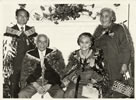New anti-racist groups
In the early 1970s new anti-racism organisations were formed to address the consequences of colonisation. Ngā Tamatoa, made up of young Māori, campaigned on issues such as the loss of land and language, and breaches of the Treaty of Waitangi. The group Te Rōpū Matakite o Aotearoa campaigned against the loss of Māori land and organised the huge 1975 Māori land march, bringing Māori political issues to national attention.
Waitangi Day became known for colourful protest actions, especially by Māori under the banner of the Waitangi Action Committee.
Māori and non-Māori worked together on issues of domestic racism during protests over dawn raids by police on the homes of Pacific Island overstayers, who had come to New Zealand on temporary work permits, and over the return of Māori land at Raglan and at Bastion Point in Auckland.
Ending the dawn raids
Dawn raids by police on Pacific Island overstayers were a major concern of anti-racist groups in the mid-1970s. The Citizens Association for Racial Equality (CARE) mobilised other groups to campaign for a fairer immigration policy, and for better conditions for Pacific Island migrant workers. In March 1974 CARE, Ngā Tamatoa, the Polynesian Panthers, trade unions and other groups picketed the liner Ocean Monarch in Auckland to prevent it deporting Tongan overstayers. The ship’s British crew supported the picket and refused to sail with the overstayers on board. The government rushed through a new immigration policy the following day.
1981 Springbok tour
When a South African rugby tour of New Zealand was proposed for 1981, the anti-racism movement grew larger and more unified. Coalitions of anti-tour groups arose in the main centres. In Auckland MOST (Mobilisation to Stop the Tour) was established, and in Wellington COST (Coalition to Oppose the Springbok Tour). While the Springbok team was touring the country more than 1,500 people were charged with protest-related offences. The protest campaign galvanised and strengthened New Zealand’s anti-racist movement. After 1981, no more racially selected Springbok teams toured New Zealand.
Actions against institutional racism
Longstanding issues of racism within official institutions also came to the fore. In 1970 the Nelson Māori Committee began giving legal advice to young Māori appearing in court, highlighting the institutional racism of the judicial system. In 1973 the Auckland Committee on Racism and Discrimination (ACORD) was formed to research and expose institutional racism in the education, health and social welfare systems, as well as the police and the courts, and to promote biculturalism. Together with Ngā Tamatoa and the Polynesian Panther Party, formed in 1971 by New Zealand-born Pacific Islanders, ACORD set up New Perspectives on Race to provide anti-racism workshops in churches, community groups and government departments.
In 1984 the Women’s Anti-racism Action Group, comprising staff of the Department of Social Welfare in Auckland, published a report on institutional racism in their workplace. As a result, the government later undertook to respond better to the needs of Māori. Various anti-racism groups were also active in their local communities. In Wellington, Double Take and Urban Training to Combat Racism were formed in 1978. Fight Against Institutional Racism emerged in Palmerston North. In 1982 members of mainstream churches launched the Programme on Racism to educate fellow churchgoers. The programme held anti-racism workshops and published a monthly newsletter.
Project Waitangi
In 1985 a national anti-racism programme, Project Waitangi, was launched to educate New Zealand communities on the Treaty of Waitangi. Project Waitangi had a mainly Pākehā membership but regarded itself as accountable to Māori views. By 1990, the 150th anniversary of the signing of the treaty, it aimed to educate as many New Zealanders as possible about the treaty’s place in present-day New Zealand society. Some of the original educators from Project Waitangi and other anti-racism groups continued delivering treaty education after 2000. Thousands of New Zealanders attended anti-racism and treaty workshops.
